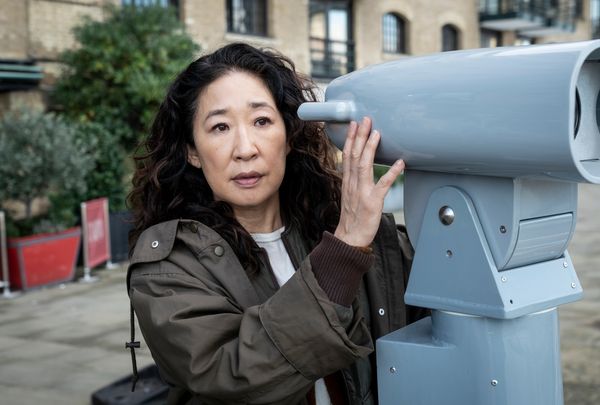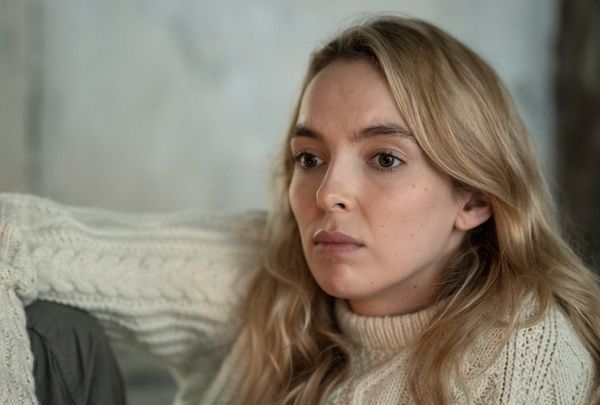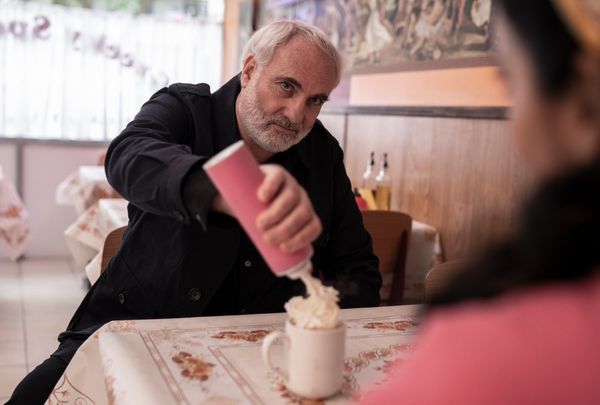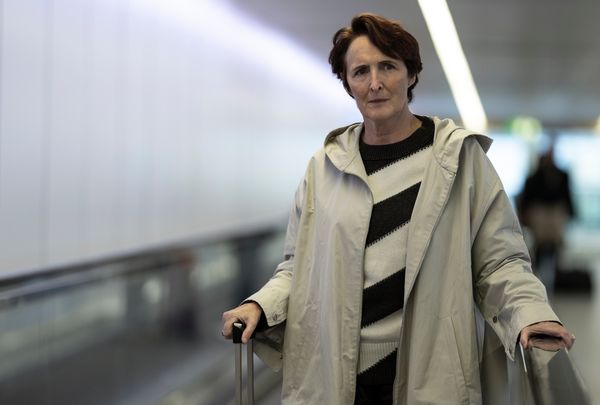“Killing Eve” boss on that shocking finale: “It just felt like the most truthful end”
If you heard a resounding collective scream this weekend, that may be because “Killing Eve” has come to an end.
When the BBC America series began in 2018, it breathed new life into Sandra Oh’s career. After a decade on “Grey’s Anatomy,” Oh returned to TV, but this time in a life-changing lead role playing title character Eve Polastri, an intelligence agent in England who becomes obsessed with the idea of a killer named Villanelle.
At the same time, “Killing Eve” catapulted Jodie Comer into the stratosphere, as she attacked her role as a hired assassin, making the character of Villanelle lovable, misunderstood and strange, not to mention a fashion icon. Is it any wonder that Eve becomes obsessed with Villanelle herself, once she meets her? And keeps on meeting her over the course of four seasons. (Sometimes, knives were involved.)
“Killing Eve” may have turned Comer into a star, but it reminded viewers why Oh is one – and then gave her the platform to show it.
Related: For the “Killing Eve” final season, Eve is “embracing a more Villanelle side of herself”
It was hard to exactly pin down Villanelle and Eve’s relationship for a long time, as it was hard to classify the show, which eluded explanation. The best stories always do. The Atlantic described “Killing Eve” in 2016, the year of its premiere, as “tricky to categorize.” But even in its first season, the show seemed prescient, “point[ing] to where television is heading,” according to The Atlantic: “Concepts that might once have been impossible sells to networks or premium cable have proven their potential on other platforms, making outlandish, outré, and oddball pitches more appealing.”
“Killing Eve” was all three. Based on a series of thriller novellas by British writer Luke Jennings and adapted by “Fleabag” creator and star Phoebe Waller-Bridge, the show was quirky, dark (so much death), but also funny and emotional, with the central relationship between the two women at its black heart. Of course, they would fall in love. Of course, love is not always easy. Or possible.
 Sandra Oh on “Killing Eve” (Olly Courtney/BBC America)And on Sunday it has come to an end, the culmination of four seasons that started with such fanfare, surprise and promise. The cat-and-mouse, will-they-won’t-they relationship between Villanelle and Eve kept viewers returning, as did the twisty psychological turns that asked us to look at our deepest desires.
Sandra Oh on “Killing Eve” (Olly Courtney/BBC America)And on Sunday it has come to an end, the culmination of four seasons that started with such fanfare, surprise and promise. The cat-and-mouse, will-they-won’t-they relationship between Villanelle and Eve kept viewers returning, as did the twisty psychological turns that asked us to look at our deepest desires.
Audiences get one such desire realized in the finale: Eve and Villanelle together as a couple. They first team up on a mad stolen-RV road trip bent on a mission to kill the members of The Twelve. But along the way, they finally come together as bloodthirsty equals . . . and lovers, sharing a kiss and more. Unfortunately, just as their self-appointed homicidal mission is done, and they enjoy a celebratory hug on the deck of a boat, Villanelle is shot. The two jump overboard to evade gunfire, but it’s too late. They part ways in the water.
Salon spoke with this season’s head writer Laura Neal about the characters’ final journeys, getting Villanelle and Eve together at last – and that shocking ending.
This interview has been edited for length and clarity.
One of the things I love about this season is that Villanelle and Eve get to be together. But they’re together in their own way, and it’s slow and seems natural. Was it a challenge to figure out the right way for them to finally get that time?
It was both a challenge and also a real joy. On one hand, it was a challenge because I think there’s a nervousness about seeing them too much together, in case a magic bubble pops and the kind of tension that fuels their relationship dissipates. I think that was helped by it being the final episode, knowing this was the last time we were ever going to see these two characters interact with each other.
“She is steeped in killing. It felt appropriate that her end would be bloody in some way.”
I also think the mechanics of the plot, where they find themselves geographically, and also, of course, emotionally, allows them to spend time with each other in a way that we’ve never been able to see them spend time with each other before. There’s a kind of intimacy to their relationship in Episode 8 that feels possible only because of the unique dynamics of that episode.
When it came down to writing it, I thought it was going to be hard, those scenes, and they turned out to be some of the most joyous scenes to be able to write the whole season. Maybe part of me was sort of itching to get them together, and then I was able to do it just for that episode.
It felt like the logical way it would happen. They’re on this road trip.
The idea of them on a road trip always tickled us because we were like, who would drive? The two of them stuck in a car together – who would pick the music? The practicality of them being forced into a domestic situation always really tickled us as writers.
Like Bonnie and Clyde.
Exactly, but with rebels.
 Jodie Comer as Villanelle in “Killing Eve” (David Emery/BBC America)Well, it wasn’t totally unexpected, of course, given the kind of character she is, but it was still a shock when Villanelle was shot at the end. On a show like this one, where it feels like nobody is safe, anything could happen at any time, what were the conversations like about choosing characters’ ultimate fates? Were there other scenarios in your heads for the ending, like Eve dying? Or both of them dying? Or both of them living? How did you decide that this ending was the one?
Jodie Comer as Villanelle in “Killing Eve” (David Emery/BBC America)Well, it wasn’t totally unexpected, of course, given the kind of character she is, but it was still a shock when Villanelle was shot at the end. On a show like this one, where it feels like nobody is safe, anything could happen at any time, what were the conversations like about choosing characters’ ultimate fates? Were there other scenarios in your heads for the ending, like Eve dying? Or both of them dying? Or both of them living? How did you decide that this ending was the one?
We discussed all of those scenarios. All of the ones you just said. We had really serious long conversations about it because we wanted to make sure that the one we went with was the right one. And I think the reason we went with this one is because it just felt like the most truthful end to both of these characters’ stories. Especially with Villanelle. We had a lot of discussions with Jodie about Villanelle, and what the most satisfying end point for her was.
“Villanelle is too enormous a character to be contained on an earthly plane.”
I think there are a couple of things that felt really important. One is that this is a character who has doled out so much violence herself in her life, and so much pain and destruction. She is steeped in killing. It felt appropriate that her end would be bloody in some way.
On the other hand, we liked the idea of her finally achieving something that she wanted to achieve, which is an act of goodness. And I think in her death, she achieves that act of goodness. She pushes Eve off of the boat and she saves Eve in that moment. She does this selfless thing that I think she talks about wanting to do in Episodes 1 and 2, and she can never quite find the right way to do it. So, even though her ending in some ways is tragic, I also think in some ways it’s triumphant, because she proves to herself and to Eve – and to the audience almost – that she can change, and that feels really emotional, I think, for me especially writing it.
It was very emotional watching it too, for sure. Lots of emotions. That leads into my next question, which is: do you feel this is Villanelle’s full journey? She did complete that last mission, and she also dispatched The Twelve, as she said she was going to do. But she’s gotten out of desperate situations before. I know, in the books, she fakes her own death. Is this really it for Villanelle? Is this her final journey?
I think in some sense, it’s her final journey. I do believe that Villanelle is dead. But the way I’ve always looked at it is: Villanelle is too enormous a character to be contained on an earthly plane, and she doesn’t so much die as she transcends. She becomes this celestial being. It’s almost like that’s what she’s destined for. She isn’t destined to walk among the earth with people like you and I; she’s destined for something greater, and when she achieves her mission of killing The Twelve, it’s almost like, “Well, what next?” For me, the answer is: something that’s not on this earth.
That’s how I look at it, and there’s a couple of allusions to that, even in the way the ending is shot.
I wanted to talk about that, how Villanelle and Eve almost touch, kind of like Michelangelo’s “Creation of Adam.” Was that intentional, to try to bring back the religious iconography of Villanelle?
“You can’t train people to be monsters and not expect them to act monstrously towards you.”
For sure. I wanted that to have a real sense of scale, and I wanted there to be a nod back to Episodes 1 and 2. For ages, I really wanted to put this scene in where you have the return of the vision from Episode 2, and you see Villanelle as the vision at the very, very end.
But it turned out, we didn’t really need that because we could incorporate all of those visual references into the end scene itself. So, like you say, there’s the fingertips almost touching, and there’s also the blood billowing out that looks like angel wings. There’s this kind of celestial light. I think it packs that last moment with hints that Villanelle is kind of ascending rather than dying, if you know what I mean.
We also have the tarot card reading, which I thought was such a great move. And so evocative, that Villanelle’s future is the sun.
I had such fun writing that scene. That scene was there right from the very original iteration of Episode 8. It felt really fun to toy with this idea of fate and spirituality when it comes to their relationship. And then of course, to kind of subvert that by giving an egotistical character the reading of: oh, you are going to become the sun! It just felt so appropriate for Villanelle. And then of course, to foreshadow Eve’s death and to have that flipped at the end.
 Kim Bodnia on “Killing Eve” (David Emery/BBC America)
Kim Bodnia on “Killing Eve” (David Emery/BBC America)
I also wanted to talk about Konstantin (Kim Bodnia), who’s a fan favorite, and who became one of my personal favorites too. This time, we did see his end, and we did see the body, unlike Villanelle. In fact, Pam (Anjana Vasan) embalmed him, which is so weird and loving. What was the thought process behind deciding his character’s end?
We liked the idea that finally, he’s cornered. Finally, here’s a situation he can’t get out of. We always see him wriggle out of situations. We loved the idea of this is the one situation he can’t wriggle out of.
“Villanelle instilled a boldness in Eve to be the person she has always been, but has perhaps been afraid of showing the world.”
And I love the tragedy as well of, actually, this is the moment where we see him emotionally opened up a little bit in a way that we haven’t really seen him before. It feels like he’s actually understanding himself more as a person and he’s understanding what’s important to him. And it feels like he’s reaching for a life that isn’t this. But of course, the life that he’s established for himself catches up with him.
You can’t train people to be monsters and not expect them to act monstrously towards you, so I do think there’s an inevitability to his end. But also we wanted to make sure that the method of his death felt suitably Konstantin. So, the idea that it’s with a pizza cutter, a kind of ridiculous object, felt fitting for him as a character who has given us so much humor over the seasons.
And he tells Pam he’s proud of her.
They act that scene so well, the first time I saw that, I just couldn’t, I couldn’t take it. I think it’s beautiful the way they’ve both done that.
When learning The Twelve’s backstory, we were treated to a younger version of Konstantin, played by the actor’s own son, which I didn’t know at first. I thought, “Wow, he’s really good. That laugh is perfect.” What was it like when you realized Louis Bodnia would be cast to play a younger version of his father’s role?
We always knew that Konstantin – that Kim [Bodnia], sorry – had a son. So, even when we conceived that role, that idea came to us quite early. We were so pleased to be able to get [Louis]. It was tricky with COVID and getting him over here, but he does have the laugh down to a T, which feels like one of the most important things. And there is a familial resemblance. It just felt fun. The Carolyn-Konstantin relationship is such a joy to watch. There is so much mystery about their past, so it felt really fun to be able to dive into that, as it’s the final season, and just answer some of those questions.
 Fiona Shaw on “Killing Eve” (David Emery/BBC America)
Fiona Shaw on “Killing Eve” (David Emery/BBC America)
And to have the viewer slowly realize who these people are, and what their place is. I did want to talk about Carolyn (Fiona Shaw), because she ends up better than I thought she would. Although, of course, of all the characters, Carolyn’s going to end up on her feet. There has been speculation that the flashback of a younger Carolyn is maybe the inspiration for a spinoff, or some other series?
I’m afraid I know absolutely nothing about that. It’s speculation as far as I know.
Maybe it’s just hopeful, that we’ll see them again. There are some questions still unresolved at the end of the show. We don’t know everything. For example, we don’t know explicitly who killed Carolyn’s son Kenny (Sean Delaney). What was the reasoning behind leaving questions like that open to interpretation?
I think part of the joy of the show is some of the ambiguity, so we didn’t want to answer every question. I also think we had to choose what were the important questions to answer. And it felt like a focus on the Eve-Villanelle relationship was perhaps more important than finally revealing exactly who The Twelve are.
Also, in terms of the Carolyn and the who killed Kenny question, for me what feels important is the revelation that it doesn’t really matter to Carolyn who killed Kenny. It matters that she has an excuse to behave in the way that she wants to behave. It felt appropriate not to come down definitively on that, because, really, the story point is: this is a woman who just needs a reason to behave like this rather than needs to understand that, and then she’ll rest. She’ll never rest.
Want a daily wrap-up of all the news and commentary Salon has to offer? Subscribe to our morning newsletter, Crash Course.
Could you talk about the ways that Eve changed by the end? By knowing Villanelle, by getting to love her and be loved by her, by having these extreme experiences? I mean, Eve kills by the end. She’s become a person who kills for the people she loves.
For me, the thing that Eve learns is how to act without fear and how to act without shame, and I think that’s what attracted her to Villanelle in the first place. And that’s what Villanelle gives her. It’s a kind of like Villanelle instilled a boldness in Eve to be the person she has always been, but has perhaps been afraid of showing the world. And that, to me, feels very inspiring, as a woman watching the show, that Eve can take that from Villanelle, albeit via extremely violent roots.
More stories like this:

